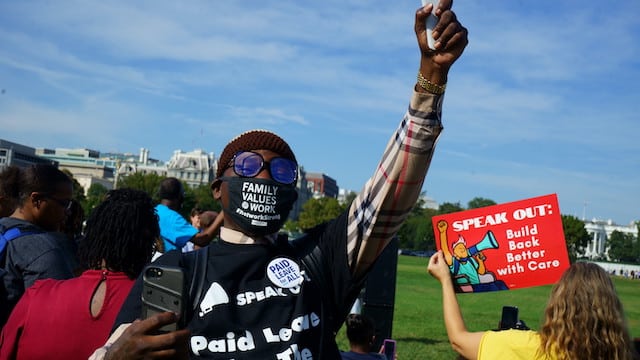First Couple wants workplaces to value all families

A view from the White House Forum on Workplace Flexibility
By Ellen Bravo
As executive director of the Family Values @ Work consortium, I was one of the 100 people invited to participate in yesterday’s White House Forum on Workplace Flexibility. Anyone familiar with workplace change knows what a difference it makes in a company when top leaders embrace a new direction. The same is absolutely true for our government.
President Obama and Michelle Obama, other top government officials, corporate leaders, researchers and advocates, all agreed workplace flexibility is good for workers, families, business and the economy — and that most people don’t have it. While the forum focused mainly on voluntary best practices and culture change, I was delighted to hear the First Lady, President and Labor Secretary Hilda Solis talk about the need for public policy as well, including paid sick days and paid family leave. Advocates drew out that need in each breakout session.
The event began with findings from a report of the Council on Economic Advisers, “Work/Life Balance and the Economics of Workplace Flexibility.” As Valerie Jarrett, director of the White House Council on Women and Girls, put it, flexibility at work is “not just the right thing to do, but the smart thing to do to stay competitive.” CEA member Christine Romer described flexible policies as “crucial to attract and retain, reduce absenteeism and turnover. That helps the whole economy. They also provide social benefits. We can invest more in kids, take care of parents — that’s good for society.”
Michelle Obama described her own work-family challenges, including having to take baby Sasha to a job interview. She got the job — the company president was a new dad — but she knows that most people are not as fortunate as she’s been. “Most have no access to any kind of family leave policy whatsoever,” she said, “no flexible arrangement, no paid sick days … That’s why we support the Healthy Families Act.”
In my breakout session, I responded to a question from Domestic Policy Advisor Melody Barnes about the role of government. Here’s what I said: “For many workers, especially low-wage, flexibility means ‘you’re free to quit,’ leave means ‘if you leave, don’t come back.’ The greatest inflexibility is being fired for having a sick kid, or being allowed to take leave but given no way to afford it. Government can provide a floor, to guarantee some flexibility for all. I applaud those best practice employers in the room. We need you join with us in calling for a level playing field.”
At the closing session, the president announced his efforts to transform his own workplace, including a pilot project in the Office of Personnel Management that will explore different strategies for increasing schedule flexibility and refocus the department on measuring results rather than time in the office.
Noting that women are disproportionately affected by inflexibility — “as Michelle always reminds me” — President Obama said that “plenty of fathers wish they had more time with their kids, sons wish they had more time with elderly parents.” He described the issue as being about “the well-being of families and businesses, the strength of our economy.”
“Caring for loved ones and raising the next generation is the single most important job we have,” he concluded. “It’s time we made it a little easier for folks.”
We now have a president and First Lady who recognize that all families must address these work and family struggles and that some families have more resources, and flexibility — and power — to do so. They understand that government can educate, give encouragement and incentives, but it must also give protection by creating a floor of minimum workplace standards. Our job is to continue to build a powerful movement to make sure that happens.